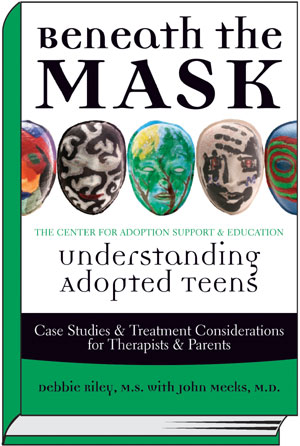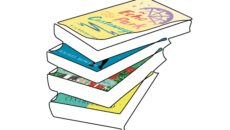C.A.S.E. Publications; 2005
Buy Beneath the Mask: Understanding Adopted Teens on Amazon.com >
Dear Mom and Dad, care to know what’s going on in your adopted teen’s head? Think identifying some strategies to deal with all those feelings might restore some peace at home? Wonder if therapy might be helpful as your son navigates the rocky shoals to adulthood?
Beneath the Mask: Understanding Adopted Teens offers all this and more. The Center for Adoption Support and Education (C.A.S.E.), in Silver Spring, Maryland, is one of the few centers that exist exclusively to provide clinical, supportive, and educational services to adoptive families and their children. Riley has worked with adolescents for over 25 years, the last 13 exclusively with adopted kids at C.A.S.E.
Originally conceived and written as a guide for therapists working with adopted adolescents, Beneath the Mask is also an extremely valuable resource for parents. An adoptive mother herself, Riley clearly respects the motives, skills, and goals of adoptive parents of teens. She recognizes that adolescence is not easy for parents, as well as that it’s a trying time for teens themselves. But she is confident that parents are part of the solution.
Riley’s thesis is that adopted teenagers have unique hurdles to accomplishing identify formation, the primary task of adolescence. It’s only common sense: If teens approach identify formation by comparing themselves (in terms of value systems as well as physical appearance) to their parents, it’s bound to be more complex when there are two sets of parents, one set of which is often unknown, and perhaps unknowable.
Riley identifies six common stuck spot issues for adopted teens as they progress through the developmental tasks of adolescence. Not all teens struggle with every issue, and those who do will move into and out of them, at varying levels of intensity. Riley insists, however, that such issues are normal for adopted teens and do not represent psychopathology. But therapists and families must be aware of these issues in order to treat and to parent adopted teens successfully.
Although written to educate counseling professionals, the book is not filled with jargon. Extensive case studies illuminate strategies parents can use with their own teens. In the case studies, we hear the voices of the adopted teens themselves. Here’s what they are thinking, what they’re telling (and not telling) their parents, and why. Guidelines for therapists, which can be adapted by parents, are provided throughout.
Beneath the Mask has important information for all adoptive parents of teens. If your teen is struggling (or if you are), this book is critical to help you determine whether therapy might be helpful, how it works with adopted teens, and what can be accomplished. If your teen is already in therapy, make sure the counselor is familiar with this book, even if you have to give her a copy yourself.
Reviewed by Susan Freivalds, editorial advisor to Adoptive Families magazine.



